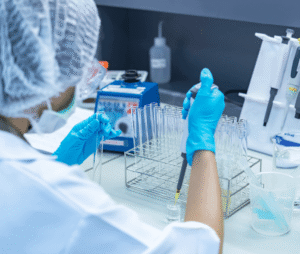OUR SERVICES

The ISO 15189:2022 standard is specific to medical laboratories and presents requirements for quality and competence. The accreditation process gives entry to medical laboratories with an effective quality management system and the technical competence to provide accurate, reliable, and timely results consistently. It is critically important for patient care to direct all activities, patient preparation, sample collection, to the interpretation and reporting of results.
The standard identifies the importance of an ethical and governance framework that focuses on the requirements of patients and information from healthcare providers. Our standard is not only applicable to a medical laboratory but also assists in collaboration and information sharing with other healthcare services.

This international standard, IS/ISO/IEC 17025:2017, defines the general requirements for the competence, impartiality, and consistent operations of testing laboratories. The accreditation of testing laboratories consistently considers the technical requirements and the quality management system. This confirms the laboratory has the capacity for competent operation and to produce valid results. It is especially important for industries that rely on testing to ensure their products will perform as expected in their intended use.
The laboratory is considered to accept a commitment to maintain quality practices and is therefore building confidence in its customers, regulators, and any other interested parties. The accreditation is a supported document of international recognition. We help in facilitating acceptance of test reports between countries, as well as reducing costs through reduced re-testing.

The IS/ISO/IEC 17025:2017 standard is also relevant for calibration laboratories as it specifies the same basic requirements to ensure competence and consistent operation. Accreditation of a calibration lab indicates that the lab has the personnel, processes, and equipment in place to provide accurate and reliable calibrations. These are critical elements of measurement integrity within many sectors.
In addition to verification of the lab, an accredited calibration lab can also offer a certificate of calibration, which will include the logo of the accrediting body and information about the measurement data and its associated uncertainty. We provide confidence and assurance for customers, as it will indicate that the lab offers services in accordance with an internationally recognized standard and has demonstrated technical competence to an independent body.

ISO/IEC 17043:2010 is the international standard that provides the general criteria for proficiency testing (PT) providers. This is an essential tool for laboratories to show and monitor their continuing performance and technical competence. Being accredited to this standard shows that the provider is competent in the planning, development, and implementation of proficiency testing schemes.
Our accreditation process assures that the PT provider also has a quality management system in place, and the people and resources to prepare appropriate reference materials. For laboratories, participating in a PT scheme from an accredited provider also gives an independent assessment of their performance and is a legitimate marketing advantage.

The National Accreditation Board for Hospitals & Healthcare Providers (NABH) is India’s leading accreditation organization for healthcare providers. NABH accreditation is a formalized process in which a healthcare provider is inspected against a set of quality and safety standards against a national set of standards. The NABH standards include all aspects of care, from patient-centered protocols, operational practices, admission procedures, pre-operative protocols, discharge procedures, post-discharge, and follow-up care.
The NABH accreditation is internationally recognized by the International Society for Quality in Health Care (ISQua), which assures that the Indian quality framework meets internationally accepted quality systems excellence criteria. Our NABH accreditation process allows hospitals to improve their quality systems, improve patient safety, and enhance public confidence in the processes of care.

The Bureau of Indian Standards (BIS) product certification is essentially a mark for quality and safety for products sold in India. Some are required to have it, and others are optional. The BIS certification program requires a product to be tested at a recognized laboratory to ensure it meets the necessary Indian standard. Once a product is certified, it enables the manufacturer to attach such to their product and sell it in India, understanding that it follows a prescribed quality standard.
The BIS certification process includes submitting documentation, submitting an application, conducting audits of the manufacturing location, and testing product samples. BIS also has a Foreign Manufacturers Certification Scheme (FMCS) that allows foreign manufacturers to place the ISI mark on their products for sale in India. We ensure that our products meet the requirements for quality and safety.


